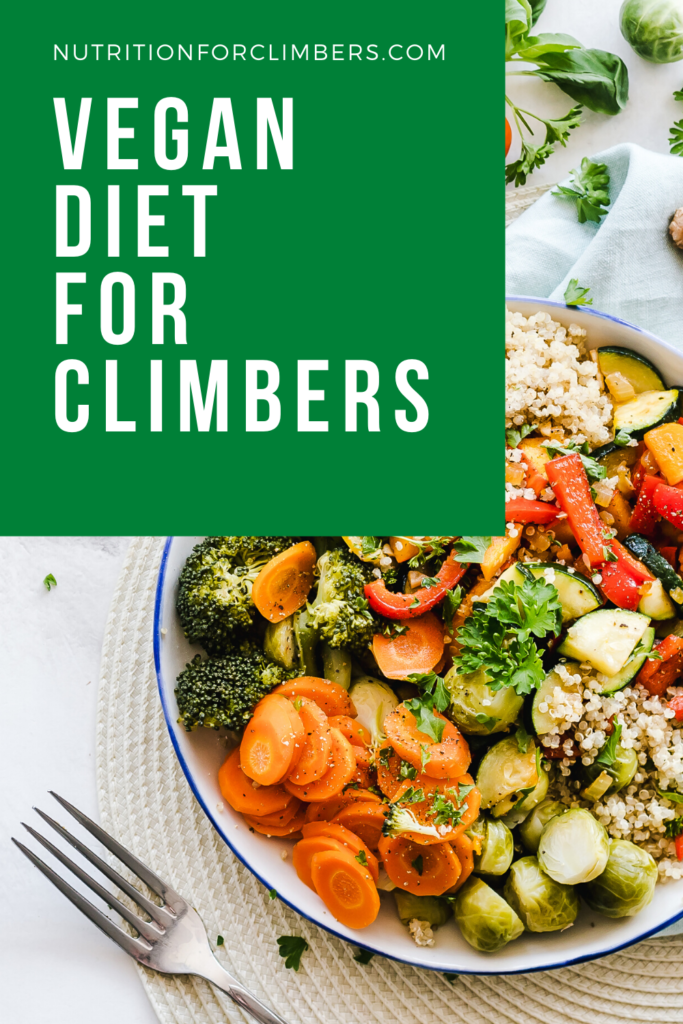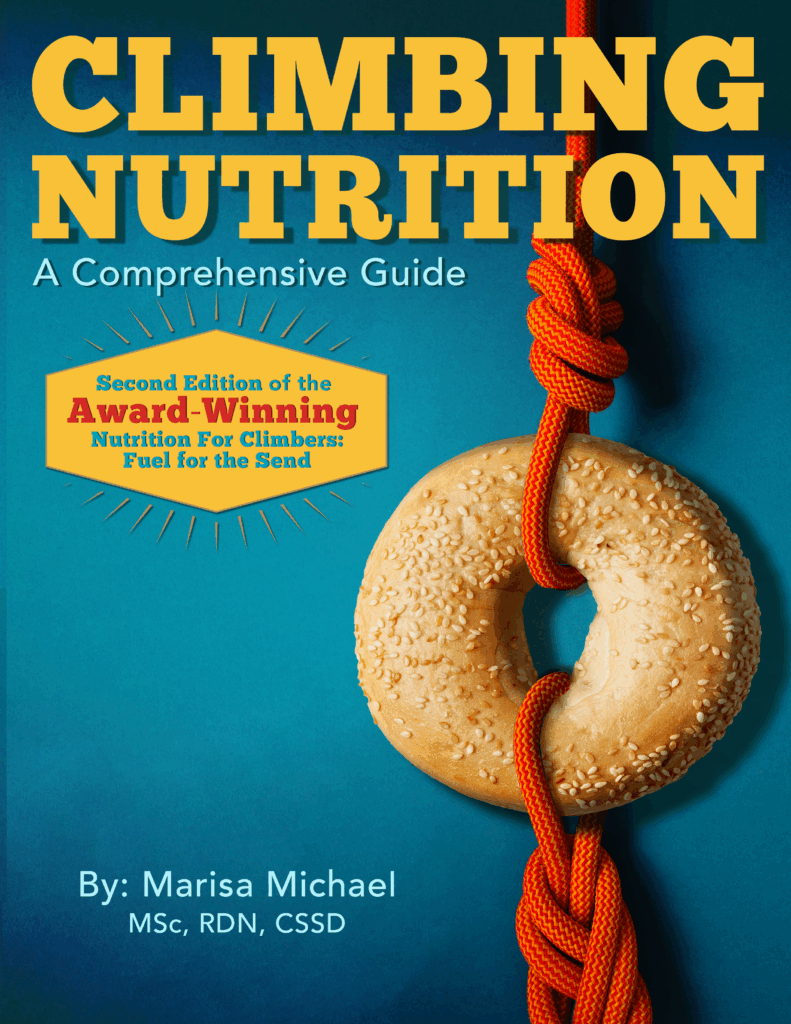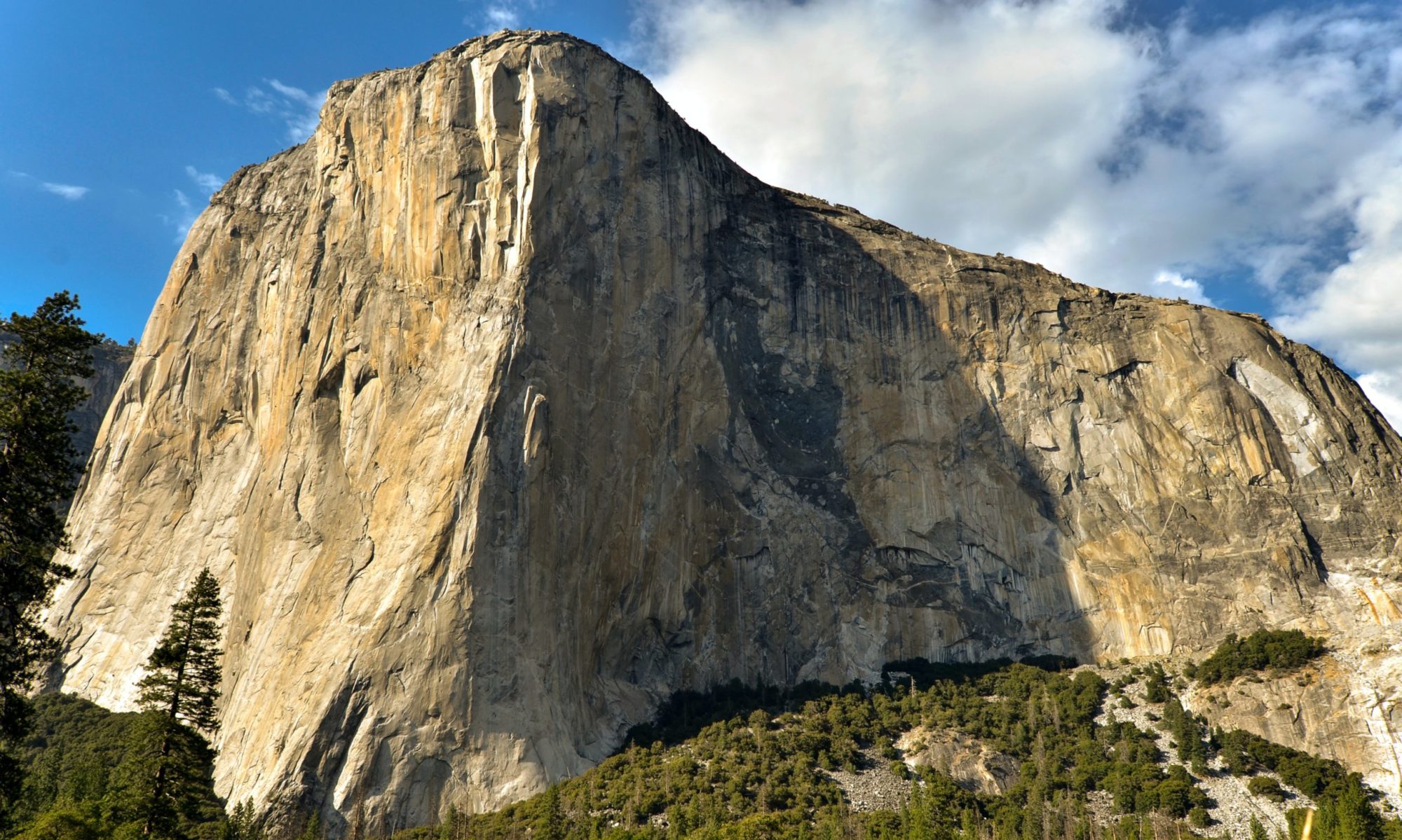Written by Jenna Moore, RD, CSSD

We’ve all been there – three grips away from the send with a dynamic power move ahead, and the nearly impossible dyno that was four grips below. The amount of energy and explosiveness that you need to redpoint this most recent project of yours is just barely out of reach. And as your partner lowers you slowly back to the ground, you start to discuss this conundrum with them.
Nutrition for climbing
In a good discussion about increasing strength and stamina on the wall, a handful of ideas may come up. Often times, one of the first things on this list is what you’re eating. My guess is that if you’re reading this, then you probably already have enough common sense to know that if you’re eating fast food before a climb, or nothing at all, you are most likely not going to see those optimal results on route.
Is a vegan diet optimal for climbers?
On a higher level, vegan diets are a popular topic. Is the vegan diet optimal or even superior for rock climbing? Are there benefits to eating plant-based versus omnivorous? This article is here to help you answer these questions, so that you can ultimately know if a vegan diet is really best for your pursuits to become a better rock climber!
What does a vegan diet for athletes look like?
For clarification, a vegan or plant-based diet is a nutrition plan that does not include animal products. It excludes foods such as meat, poultry, fish, dairy, eggs and often times honey. Many of these animal products contain large amounts of nutrients that humans need to survive. While it is absolutely possible to get these same nutrients from a plant-based diet, it most often times requires much more thought and planning to execute.
If someone wants to pursue a vegan diet but doesn’t want to do the research as to how to get all the nutrients, it may not be a good fit. However, if you are someone who is willing to do the work and learn which foods are important to add to your everyday life, read on!
There are a handful of nutrients that are important for vegan athletes. While this article lists a few of the main ones, I want to be transparent by saying that this is just the tip of the iceberg. If you are genuinely serious about developing a plant-based nutrition plan for yourself, one of the best ways that you can start this successfully is by talking with a registered dietitian (an RD) and ideally a certified specialist in sports dietetics (an RD with CSSD).
Vegan sources of protein
As a climber, you use your muscles much more often than the vast majority of the people in this country, and you therefore have significantly higher protein needs than the average American Joe. So unfortunately, when you hear “them” say that your protein needs are actually very low, “they” aren’t talking about rock climbers or any other athlete for that matter. Can you still achieve your protein needs through a plant-based diet? Absolutely.
A few plant-based foods that are high in protein include:
- Lentils
- Almonds
- Edamame and other soy products
- Hemp seeds
- Peas
- Beans (such as kidney beans, chickpeas, etc. Not green beans)
The main trick here is that high protein plant-based foods are also typically high in either carbs or fats. Which one do you eat before a climb? Well that my friends, depends entirely on your style of climbing! Usually quick-digesting carbohydrate is needed before a climb to fuel working muscles and brain. Protein or slow-digesting carbs may be needed for longer climbing sessions.
Calcium in vegan diets
Many of us know that calcium is good for our bones, but it does so much more for us than just that! When we are grasping a new hold for the first time, this signal travels from our grip into our brain and vice versa. Calcium helps to send this signal so that it can be translated into which muscles in our hands, wrists, forearms (and so on) need to contract to hold that grip! It’s also an electrolyte that gets lost in sweat, and needs replenishment after a heavy sweat session.
We need our calcium in order to perform at our highest level. In a traditional American diet, the richest sources of calcium often come from dairy. You may have heard that leafy greens and seeds also have calcium, but do you know how much they actually have? Here’s a little more information to give you a better perspective
Daily recommended amount of calcium: 1,000 milligrams (if you are under 50 years old)
Examples of foods that contain calcium:
1 glass of cow’s milk = 305 milligrams
1 cup of raw spinach = 30 milligrams
1 tablespoon of poppyseeds = 130 milligrams
1 ounce of chia seeds = 179 milligrams
You can see that if your daily need for calcium is 1,000 milligrams, it can be a lot easier to meet your needs with dairy products. One glass of cow’s milk contains almost one third of your total daily calcium, whereas you would need 10 cups of raw spinach to equate to that much calcium. Seeds may be a better source of calcium per serving, but again, are you going to eat nine tablespoons of poppyseeds every day? This is why it is so important to talk with a sports nutrition expert and figure out a game plan when it comes to a vegan (or any other performance-based) diet!
Vitamin B12 on a vegan diet
Vitamin B12 is only found in animal products or fortified vegan products. This vitamin is a crucial nutrient for creating energy (i.e. movement) as well as the generation of nerve cells. This vitamin has also shown to reduce fatigue and increase muscular endurance. With all of these performance-related factors in mind, the last nutrient that we want to be deficient in on a route is this one.
It is a sad coincidence that this nutrient is also one of the most difficult to consume on a vegan diet. The best food sources for vitamin B12 include fortified breakfast cereals (yes, you can do better than chocolate puffs) and nutritional yeast. If these foods are not items that you can see yourself consuming on a daily basis as a vegan athlete, it may make sense to talk with a sports dietitian about supplementation to make sure you get enough of this valuable nutrient!
Other nutrient considerations in a vegan diet
While protein and calcium are amongst the nutrients that are commonly overlooked in a vegan diet, they are certainly not the only ones. If you are going to remove meat and other animal products from your diet, you need to find rich plant-based sources for other nutrients such as:
- Iron
- Zinc
- Other B vitamins
- Omega 3s
- Vitamin D
Disadvantages to a Vegan Diet
One of the most common mistakes an athlete can make when switching to a vegan diet is not taking into account how long it takes for different types of foods to be digested. Vegan diets tend to be extremely high in fiber and this is one of the last things that you want to eat when setting up for a climb. Another issue with high fiber foods in a vegan diet is that these foods are also the foods that tend to be the highest in protein. So now the challenge becomes getting in enough protein as an athlete while eating easily digestible foods while climbing. It can be a lot to juggle, but it is possible if you are willing to invest your time into learning how to do it!
Is the vegan diet right for me?
If the idea of learning about which plant-based foods are high in protein, calcium and other nutrients is something that you think that you could geek out on, and you don’t think that you will “miss” cheese or eggs because you can find substitutions, then great! Start your journey by finding a sports dietitian in your area to build a nutrition plan that suits your preferences, cooking skills and lifestyle!
Vegan diets are not appropriate for anyone with nutrient deficiencies, disordered eating patterns, or other health conditions that may contraindicate a vegan diet.
If this all sounds like a lot of work and learning, and really you just want to become a better climber regardless of what types of foods you eat, then what may make sense right now is to establish a better foundation in your understanding around performance nutrition. This is also a good opportunity to speak with a performance nutrition professional who can help you learn the basics behind nutrient timing for optimal explosiveness on the wall. For example, did you know that bananas versus almonds can give you two VERY different types of energy? Did you know that one may be better for bouldering versus top rope? Why?? These are questions that a sports dietitian can help you answer!
If you’re interested in one-on-one help, head over to Real Nutrition’s website to learn more and book an appointment.

For more comprehensive information on a vegan or vegetarian diet for climbers, check out the book Climbing Nutrition: A Comprehensive Guide.
Vegan climbers
At the end of the day the question becomes – how much work are you willing to put into your nutrition? It is already going to take an effort work to get your nutrition right if you do eat meat, eggs, honey and dairy. So if this is something that you are saying “yes” to dedicating your time to, you know where to go and what to do next! The beautiful thing about climbing is that it is a way of movement that reflects a thrilling and adventurous lifestyle. And if the thrill is what you intensely crave, why wouldn’t you pursue the knowledge to optimally fuel the movements that will take you there? Get after it my friends!
Climb high and climb on.
ABOUT THE AUTHOR:
Jenna Moore, RD, CSSD
Sports Dietitian and Nutritionist
Panorama Wellness & Sports Institute
Summit Performance Nutrition LLC
(719) 684-5754
Instagram @jennamoorerd
Facebook @jennamoorerd
Twitter @jennamoorerd
Sources
- Przeliorz-Pyszczek A., Golabek K., Regulska-Ilow B. Evaluation of the Relationship of the Climbing Level of Sport Climbers with Selected Anthropometric Indicators and Diet Composition. Central European Journal of Sport Sciences and Medicine.2019;28(4):15-26.
- Fuhrman J., Ferreri D. Fueling the Vegetarian (Vegan) Athlete. American College of Sports Medicine: Nutrition & Ergogenic Aids.2010;9(4):233-241.
- Venderley A., Campbell W. Vegetarian Diets: Nutritional Considerations for Athletes. Journal of Sports MedicineI.2006;36(4):293-305.
- Rogerson D. Vegan diets: practical advice for athletes and exercisers. Journal of the International Society of Sports Nutrition.2017;14(36):1-15.
Edited by Marisa Michael
~This is general nutrition information only and not medical advice. Always consult your healthcare provider before undergoing any diet or lifestyle change.

One Reply to “Vegan Diets for Rock Climbers: Is it Right for You?”
Comments are closed.